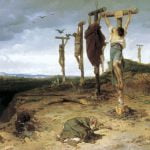Physical culture has long been one of the key aspects of our lives. Since the dawn of time, people have benefited from the benefits of body training.
Today, training is usually identified primarily with competition and the aesthetic sphere of our body, in other words – with its external appearance. Mass-media at every step show what an aesthetic silhouette should look like, regardless of gender. This should consist primarily of the right amount of muscle tissue, with minimal fat. This is one of the main reasons for the growing popularity of body culture nowadays.
Let’s go back to ancient Greece to see what the approach to physical culture of those times looked like. Let’s start with the fact that the emphasis has been placed not only on physical culture, but also on the mind and culture, so that people develop at every possible angle. This system was called kalogathia (“beautiful and good”). Each city had its own complex, which was called a gymnasium divided into a stadium and a palestra. In the stadium there were such disciplines as discus throw, running or long jump. Palestra focused on disciplines such as wrestling and boxing. An important element of physical exercise were also such treatments as, for example, rubbing the body with oil or bathing in ice water. Interestingly, the word gymnastics comes from the Greek word gymnos, which means naked, because the athletes competed with each other being naked.
The ancients treated sport not only as a tool for development, but above all in terms of rivalry and spectacle. It should be mentioned above all about the Olympic Games organized up to the present day, which took place for the first time in 776 on the eve (although the sources are retracting us even to 1580 BCE). These competitions, like today, were divided into stages: qualifications, sporting events and awards ceremony. As you can see, this spectacle has kept a similar character to this day.
As you can see on the example of Greece of those times, physical effort was reduced to the absolute basis, where physical exercises, such as gears or wrestling, served as physical exercises. Physical preparation for this type of discipline required considerable work, because due to the complex nature of the disciplines, it was necessary to develop the body evenly. Kallos sthenos (beauty and strength diagram) is a program characterized by using your own body as a training load. This program has been successfully used as a tool to prepare for the upcoming battle. Kalistenika, because this is the name of the discipline that is extremely popular nowadays has gained not only popularity, but also the tools used. The basis of the training based on the ancient principle is a rod or handrail.
As you can see from the article, the sport of modern times owes much to its ancient predecessor. As it turns out, not only the idea of sport in itself, but also the golden rule of competition or even body development exist to this day. It is enough to look at the increase in the popularity of sports programs, such as Kalistenika, to see that the return to the basic training assumptions is still in fashion.







